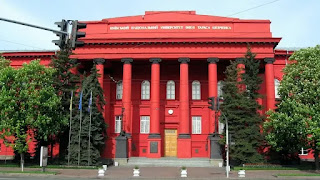Ukrainian University Bans Russian Language Courses in Decolonization Effort.
Ukrainian University Bans Russian Language Courses in Decolonization Effort
In the heart of Ukraine, an intellectual battleground unfolds. At the Taras Shevchenko National University of Kiev (KNU), one of Ukraine’s oldest and most prestigious institutions, the rector, Vladimir Bugrov, has announced the ban on Russian language and literature courses, and Russian scientific sources. This academic strategy, deemed as ideologically correct and a step towards decolonization, has been marked as a significant milestone in Ukraine’s ongoing efforts to sever cultural and historical ties with Russia since the 2014 Maidan coup.
(Read Also: Ukraine’s Invisible War: SBU Neutralizes Russian Underground Group)
Decolonizing the Curricula
According to Bugrov, the university previously offered Russian, Belarusian, and Farsi (Persian) language and literature courses at the Institute of Philology. However, these programs were closed last year, a decision driven by an emotional desire to distance the university from Russian influence. Now, the university has also prohibited the use of Russian-language scientific literature. Despite these sweeping measures, Bugrov acknowledges a complex truth: it’s impossible to entirely abandon Russian studies at higher-education institutions. Russia and Belarus, he contends, will not simply disappear.
From Russian Studies to ‘Sovietology’
Bugrov’s vision for the future of Russian studies at KNU echoes the Cold War-era “Sovietology” studies in the West. Drawing a compelling analogy, he likens the study of Russian literature to the study of viruses in medical or biology departments, emphasizing the need for critical analysis. Despite this, he asserts that Russian language and literature should not be studied in the country’s schools.
Ukraine’s Larger Linguistic Landscape
This decision by KNU is a microcosm of a larger campaign by Ukraine to break cultural and historical ties with Russia. Since the 2014 Maidan coup, Ukraine has been actively working to distance itself from Russia, both politically and culturally. A recent survey conducted by the Kiev-based NGO Spilnomova reveals an interesting language situation in Ukraine. The survey found that approximately 20% of preschoolers in Kiev speak exclusively in Russian, while only 15% speak Ukrainian in their daily lives. Despite the teaching in Ukrainian in schools, teenagers continue to predominantly speak Russian. This linguistic reality underscores the complexity of Ukraine’s efforts to “de-Russify” and the long shadows cast by historical ties.
(Read Also: Echoes of Unrest: Odesa on Edge Amid Multiple Explosions)
The decision of KNU to ban Russian language courses and literature, as well as Russian scientific sources, is reflective of the ongoing tensions between Ukraine and Russia. It symbolizes Ukraine’s struggle to assert its cultural and academic independence while grappling with the realities of its linguistic landscape. The move towards English-language literature for exact sciences is a testament to the university’s desire to align with the global academic community, notwithstanding the costs and challenges involved. As the conflict between Ukraine and Russia continues to unfold, institutions like KNU are shaping Ukraine’s cultural identity and future, one course at a time.
FOR MORE INFORMATION PLS FOLLOW US ON FACEBOOK @Marolling / INSTAGRAM @Marolling1 / X @Marolling1: ALSO STREAM US LIVE ON ALL DIGITAL PLATFORMS via : https://linktree/marollinge\ #marollingOnline/Tv




Comments